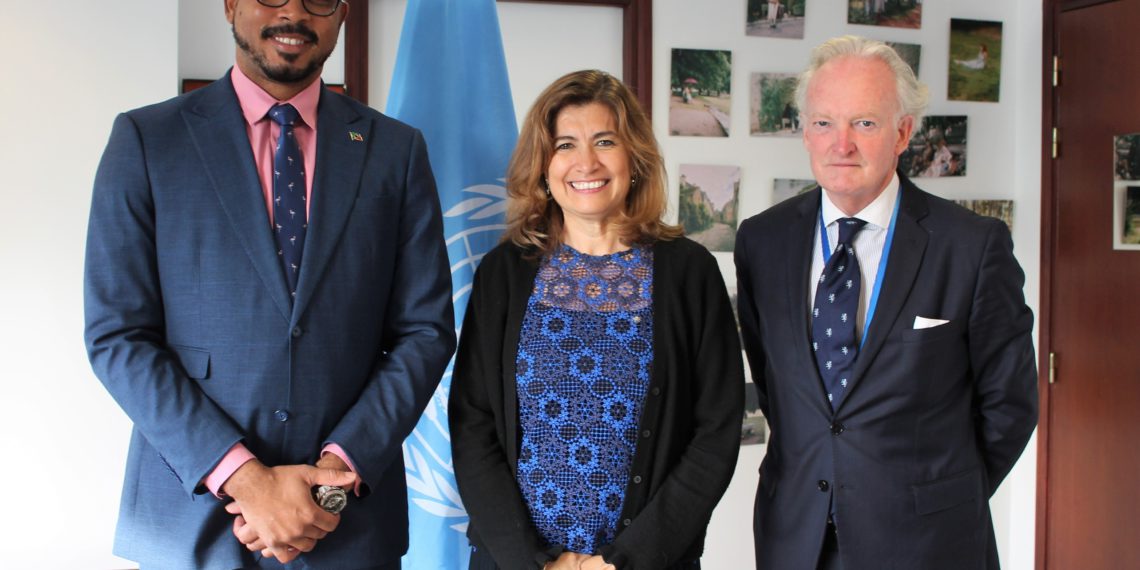Paris, France, November 12, 2021: St. Kitts and Nevis ranks as one of the most active English-speaking Caribbean states with a prominent role in a range of UNESCO activities accomplished on the ground. That was the consistent message heard by the Hon. Jonel Powell, Minister of Education, Youth Empowerment, Sport & Culture, during a series of high-level meetings with the UNESCO Secretariat on the fringes of his attendance at the 41st session of the UNESCO General Conference, held in Paris this week.
Minister Powell represented the Government of St. Kitts and Nevis at this biennial ministerial-level conference hosted by the UN specialised agency, UNESCO, which deals with education, culture, science and ITC. The Federation joined UNESCO shortly after its independence in 1983.
After delivering his national statement on 10th November before some 180 UN member state ministers, Minister Powell, accompanied by the Federation’s Ambassador in Paris, H.E. Dr David P. Doyle, embarked on a series of briefings with senior UNESCO officials, including two Assistant-Directors-Generals, to discuss progress on multiple institutional capacity-building projects on the ground in St. Kitts and Nevis, spanning education, biosphere, sports and water policies. “St. Kitts and Nevis has significantly benefited from UNESCO’s targeted technical assistance, particularly in the past two years, in developing national policy frameworks in education, sports and intangible cultural heritage”, stated Minister Powell.
In the education policy area, Minister Powell heard from UNESCO’s chief of Higher Education on the successful completion of an accreditation of qualifications project, with the assistance of two UNESCO-accredited consultants.
The overall aim was to strengthen the SKN accreditation of qualifications system and reform the Accreditation Board, involving the review of processes, policies, guidelines and regulations associated with the recognition of higher education qualifications and the proposed development of an overarching Accreditation framework to guide the registration and accreditation processes in the Federation. UNESCO will now assist St. Kitts and Nevis over 2022 in implementing the new accreditation framework and facilitate the overhaul of its Board. The Federation will be the only English-speaking state, after Jamaica, to modernise its accreditation system, benchmarked in compliance with international standards.
With the help again of UNESCO experts, St. Kitts and Nevis has innovated in developing a professionalization of the teaching force framework, a central feature of which was the creation of National Teachers Council focused on boosting standards of quality control.
On this project, the Minister met the key members of the UNESCO’s International Task Force on Teachers for Education 2030, led by the Chief of Section for Teacher Development and Secretary for the Taskforce, to discuss the preliminary recommendations designed to integrate these changes.
The UNESCO experts strongly urged the Minister to “operationalize the recommendations” by focusing on defining and institutionalising the professional operations, covering developing teachers’ standards on career path, minimum qualifications, a common register, accreditation, CDP, etc. UNESCO is now standing by to assist St. Kitts and Nevis in facilitating this professional operational standard-setting process in 2022.
The other education-related priority raised by the Minister with UNESCO experts was the integration a policy framework for education for sustainable development (ESD), as part of the St. Kitts and Nevis horizontal and vertical curriculum components in the national education programme. A ‘situation analysis’ of the Federation’s ESD existing embryonic framework will be undertaken in the weeks ahead to form the basis of a comprehensive ESD policy orientation.
One of the most successful high-profile projects to be launched in the Federation – the Intangible Cultural Heritage – now evolving beyond the 1st phase conduced on the ground, was also a topic of a briefing with the head of UNESCO’s ICH Programme.
The ICH seeks to identify, promote and protect practices, expressions, knowledge and skills that communities, groups and sometimes individuals recognise as part of their cultural heritage. Frequently referred to as living cultural heritage, it is usually expressed in one of the following forms: oral traditions; performing arts; social practices, rituals and festive events.
The Minister was keen to move to developing a national ICH policy framework, aided by funding of $99,000 via the Intergovernmental Committee for the Safeguarding of the Intangible Cultural Heritage.
Lastly, Minister Powel met with Gabriela Ramos, Assistant Director-General for the Social and Human Sciences of UNESCO, to brief her on the advanced stage in the development of a national sports policy framework, a project that was originally at the instigation of UNESCO’s sport policy unit. A UNESCO-accredited sports expert final recommendations, now approved by Cabinet of Ministers, is moving towards the implementation stage, with the assistance of the Commonwealth Secretariat in London.
Before leaving Paris, Ambassador Doyle organised a meeting for Minister Powell to greet Brazil minister for education, André Chermon, and Science Minister of Venezuela, Gabriela Jimenez.
The Minister was briefed on the UNESCO Transcultural Programme, an European Commission funded activity aimed at integrating Cuba and the wider Caribbean region through supporting young artists and cultural professionals developing a career related to culture and creativity.
Commented Ambassador Doyle on the conclusion of Minister Powell’s visit to UNESCO: “St. Kitts and Nevis can be proud of its legacy at UNESCO in securing a high-level of technical expertise in critical areas of the country’s sustainable development goals that underpin education policy, a sports framework and intangible cultural heritage”.
Added Minister Powell: “Despite the challenges on the ground arising from the Covid-19 pandemic, officials from the Ministry of Education, Youth Empowerment, Sport & Culture, and relevant stakeholders, are to be congratulated for their efforts in achieving extraordinary results, working closely with UNESCO. It is reassuring to hear at UNESCO that, yet again, we have been seen by experts as a model for the rest of the Caribbean”.

